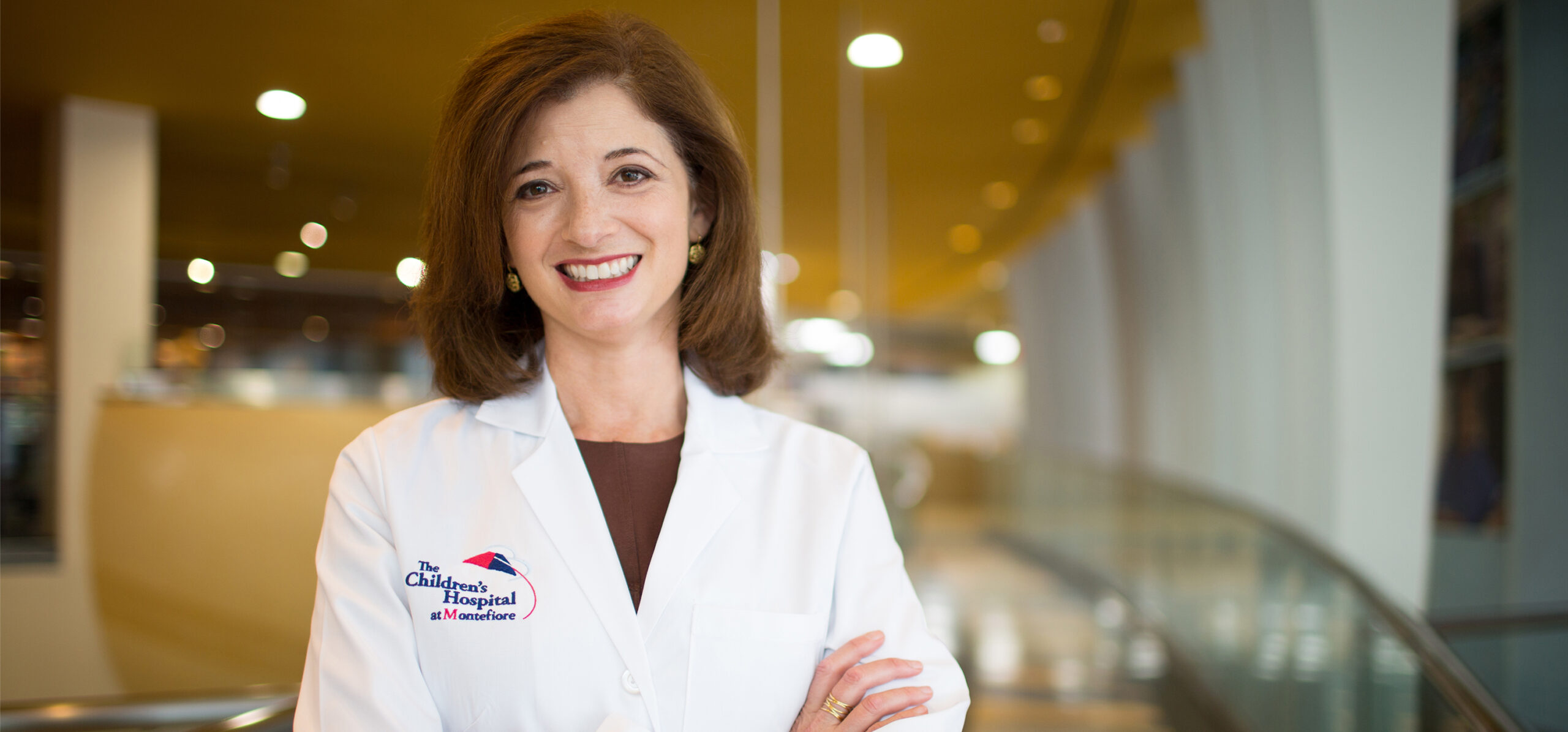
Melissa Wasserstein, M.D., is a professor of pediatrics and of genetics and the associate director of the Rose F. Kennedy Intellectual and Developmental Disabilities Center at Einstein, and the chief of the division of pediatric genetic medicine at the Children’s Hospital at Montefiore. A native of Long Island, Dr. Wasserstein earned a medical degree at the New York University School of Medicine, and then completed a residency in pediatrics and a fellowship in medical genetics at the Icahn School of Medicine at Mount Sinai. She came to Einstein in 2016.
Was there an “aha!” moment during your training that influenced your career path?
During my residency, on my first night covering the pediatric intensive care unit, one of my patients was a comatose baby. The metabolic genetics team determined that she had a rare inborn error of metabolism called “maple syrup urine disease,” a potentially deadly condition. They did some magic with IV fluids and medications, and the next day she was sitting up in bed playing. I knew then and there that I would specialize in pediatric genetics. Today, that baby is an amazing young woman in her 20s, and she’s still my patient.
Did you have any mentors?
Two pediatricians at Mount Sinai. One was Selma Snyderman [1916–2012], one of only two women in her medical school class at the University of Pennsylvania. But rather than being intimidated, she was absolutely fearless and went on to develop lifesaving treatments for children with inborn errors of metabolism. It was a very different time for women to be practicing medicine; when she had children, she was given just two weeks off for each pregnancy. Nonetheless, she and others showed a generation of women that they could be great physicians and have phenomenal family lives. The other mentor was Kurt Hirschhorn [1926–2022], a brilliant scientist, clinician, and role model. He was a pioneer in the field of cytogenetics and identified the genetic defect underlying Wolf-Hirschhorn syndrome. He loved the field of genetics as much as he loved learning and teaching, and this combination was incredibly motivating.
I’m excited to see what the next 20 years will bring as we move from enzyme replacement therapy to, perhaps, curative gene therapies.
— Dr. Melissa Wasserstein
What was the focus of your early research?
As an attending physician, I started working with patients who had Niemann-Pick disease, a rare genetic lipid-storage disorder that can cause a range of serious, progressive health problems. More than 25 years ago, I became involved in clinical studies to characterize the disease and, ultimately, in clinical trials of a novel enzyme replacement therapy. The therapy, Xenpozyme, was approved by the Food and Drug Administration in August 2022. It was a long, long journey but well worth the effort. We finally have a treatment. I’m excited to see what the next 20 years will bring as we move from enzyme replacement therapy to, perhaps, curative gene therapies. It’s such a fascinating field. You have to keep learning because things change by the minute.
Now that there’s a treatment, will Niemann-Pick be added to routine newborn screening?
Possibly. I’m leading a study called ScreenPlus, funded by the National Institutes of Health [NIH], in which we’re studying how well newborn screening works for 14 rare genetic disorders, including Niemann-Pick. For treatable rare genetic disorders, it’s important to know as early as possible. Fortunately, new screening technologies have greatly expanded the number and types of disorders that we can detect in babies. But before we screen for these disorders, it’s important to determine the accuracy of the tests and see how early detection affects the outcomes of infants who have the disorders. Another ScreenPlus focus is studying the ethical and social implications of screening tests.
Can you provide some examples of the ethical and social implications of newborn screening?
There are a lot, especially now that we can screen babies for more and more conditions. For example, should we screen newborns for conditions that might not appear until later in life—even adulthood? Should we screen a newborn for untreatable diseases when knowing about them might allow parents to plan for the child’s future and to make their own reproductive choices? As we move toward sequencing a baby’s entire genome at birth—which is a distinct possibility—the practical and ethical implications of screening will become infinitely more complicated. We need to address these sorts of questions as early as we can.
Your other NIH grant addresses inequities in genomic medicine. What is the aim of this study?
The idea behind NYCKidSeq—a joint effort of Montefiore-Einstein, the Icahn School of Medicine at Mount Sinai, and the New York Genome Center—is to increase access to genomic medicine among children from racial and ethnic minority groups in New York City. These kids bear a disproportionate burden of illness but lag in benefiting from advances in research and technology. We performed diagnostic whole-genome sequencing on 1,200 children from diverse backgrounds, with a focus on kids with unexplained seizures, developmental delays, heart disease, or immune abnormalities. We also tested new technologies to enhance education and counseling for families about genomic medicine.
You were featured in a documentary with New York Giants running back Saquon Barkley. What was the documentary about?
The National Football League (NFL) was profiling Mr. Barkley’s efforts to raise awareness about children with 22q11.2 deletion syndrome, which affects his young niece. This syndrome causes intellectual disability, congenital heart disease, and other issues. My involvement came about through the work of Bernice Morrow [Ph.D.], an Einstein professor who studies the genetics of the syndrome and was a driving force behind the creation of the Montefiore-Einstein Regional Center for 22q11.2 Deletion Syndrome, where I’m part of the treatment team.
What do you do for fun?
I am an avid New York Times crossword puzzler and a lifelong runner.